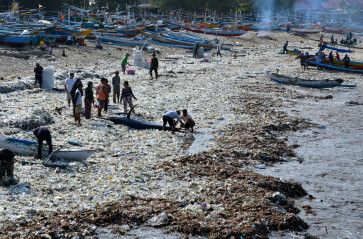The ‘Post’ lauded for commitment to democracy, holding powerful to account
Forty years on, observers and government officials alike have noted how The Jakarta Post has not only become the world’s window into Indonesia, but has also helped bring the global agenda to local readers.
Change text size
Gift Premium Articles
to Anyone

I
n its four decades on the country’s media landscape The Jakarta Post has chronicled Indonesia’s fledgling democracy, leading it to become the country’s leading English-language news outlet, bridging global and national interests.
With the curtain rising on the country’s most ambitious election year in recent memory, the onus is once again on the Post to go back to the basics of being bold and independent – qualities it has honed over five election cycles and four presidents.
The Post, which turned 40 on Tuesday, owed its formation to the initiative of several key figures during then-president Soeharto’s notorious New Order regime, people who were unhappy with the unbalanced coverage Indonesia received in foreign newspapers.
Forty years on, observers and government officials alike have noted how the Post has not only become the world’s window into Indonesia, but has also helped bring the global agenda to local readers.
“Unlike back then, there are now an abundance of [Indonesian] correspondents working for foreign papers. But, the only Indonesian media to bring Indonesian news to the world, be it good or bad, is the Post,” Yose Rizal Damuri, executive director of the Jakarta-based Centre for Strategic and International Studies (CSIS), said on Thursday.
Noting how many Indonesians had a tendency to concern themself only with the country’s domestic policies, Yose said that the Post played a key role in helping to bring Indonesians up to speed with international developments.
At a time when Indonesia is quickly becoming a key player in global politics through its Group of 20 presidency last year and its chairmanship of the ASEAN bloc this year, Foreign Minister Retno Marsudi lauded the Post for being “instrumental” in disseminating Indonesia’s foreign policy to the world.
“In a world full of challenges, our partnership will become even more important. We look forward to seeing The Jakarta Post’s more active role in providing constructive feedback to the government,” she said.
Echoing Retno, Deputy Environment and Forestry Minister Alue Dohong said that the Post’s contribution to Indonesia’s foreign agenda not only extended to diplomacy, but also to pressing environmental issues.
“The Jakarta Post has become a reference point for local, national and international [audiences] in regard to environmental issues,” Alue said. “It has also helped increase the literacy and awareness [of Indonesians] regarding these issues.”
Voice of the people
Over the course of four decades, the Post has risen in leaps and bounds from its humble beginnings to become a cornerstone of the country’s budding democracy.
“Forty years is not a short time, and for that, I am thankful for the Post’s commitment to [reporting on] democracy, human rights and social justice,” executive director of rights watchdog Amnesty International Indonesia (AII) Usman Hamid said on Saturday.
Amid setbacks in both national and global standards for civil liberties and as Indonesia gears up to face challenges of intolerance and sectarianism ahead of the 2024 elections, The Post’s coverage is something the country needs now more than ever, Usman added.
“Without media like The Jakarta Post […] then it is possible for these regressive trends to drag Indonesia back down to an era of authoritarianism.”
Like Usman, rights activist Anis Hidayah also highlighted how crucial independent media reporting is heading into what political observers predict will be a highly contested presidential election.
“This [independence] is what the Post has got going for it. I hope that this newspaper will continue to be critical and help to report on a plethora of issues, including human rights and democracy,” she said.
The Post’s independence is also what has made the publication a “pillar of reason” for many of its readers, said Indonesian International Islamic University (UIII) political analyst Philips J. Vermonte.
“With its extensive experience in the field of journalism, The Jakarta Post, through its sharp reporting and analysis, has become a medium to debunk misinformation and disinformation, which could poison [the country’s] democracy,” Philips added.
Hopes for the future
On another front, the Post has had to contend and subsequently manage to rise above three challenging years brought about by the COVID-19 pandemic and the industry-wide disruption caused by technology and social media.
Whereas countless other publications around the globe have had to close up shop, many observers have expressed their hopes that the Post will remain in print for many decades to come.
“I hope that The Jakarta Post will continue to innovate and adapt to the new challenges posed by today’s digital era, which has made it particularly challenging for print media to survive,” Ninik Rahayu, head of the Indonesian Press Council, said recently.
One of the Post’s own alumni, Jason Tedjasukmana, who is now head of corporate communication at Google Indonesia, also said that he wanted to see the newspaper continue doing what it does best.
“In the next 40 years, I hope the next generation of [the Post’s] journalists will maintain the same journalistic standards and determination to hold the powerful to account,” Jason said.









